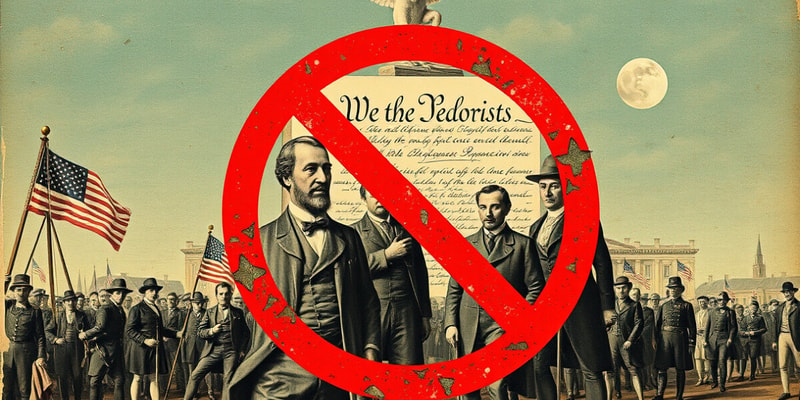Podcast
Questions and Answers
What was the main purpose for which American colonists justified taking up arms against British rule?
What was the main purpose for which American colonists justified taking up arms against British rule?
What concern did the Georgian citizen express regarding the Federal Constitution?
What concern did the Georgian citizen express regarding the Federal Constitution?
What did Benjamin Franklin argue regarding the financial responsibilities of the colonies?
What did Benjamin Franklin argue regarding the financial responsibilities of the colonies?
What approach did George Washington recommend concerning foreign alliances?
What approach did George Washington recommend concerning foreign alliances?
Signup and view all the answers
What was one major criticism of the Constitution by the Anti-Federalists?
What was one major criticism of the Constitution by the Anti-Federalists?
Signup and view all the answers
What was a key provision of Pinckney's Treaty with Spain?
What was a key provision of Pinckney's Treaty with Spain?
Signup and view all the answers
What did elite Pennsylvanians fear that led to support for a stronger national government?
What did elite Pennsylvanians fear that led to support for a stronger national government?
Signup and view all the answers
What concept did the Supreme Court establish in Schenck v. United States regarding free speech?
What concept did the Supreme Court establish in Schenck v. United States regarding free speech?
Signup and view all the answers
According to the Anti-Federalists, what did they lack in their approach to addressing their concerns about the Constitution?
According to the Anti-Federalists, what did they lack in their approach to addressing their concerns about the Constitution?
Signup and view all the answers
Which of the following did the Georgian citizen urge citizens to consider in order to protect their liberties?
Which of the following did the Georgian citizen urge citizens to consider in order to protect their liberties?
Signup and view all the answers
What aspect of the colonies' ability to pay the Stamp Act did Franklin highlight?
What aspect of the colonies' ability to pay the Stamp Act did Franklin highlight?
Signup and view all the answers
What did the language used by the Supreme Court in Schenck v. United States focus on?
What did the language used by the Supreme Court in Schenck v. United States focus on?
Signup and view all the answers
What motivation did elite leaders have for supporting the Constitution, according to historian Terry Bouton?
What motivation did elite leaders have for supporting the Constitution, according to historian Terry Bouton?
Signup and view all the answers
In the context of the Anti-Federalists, what was their view on national representatives?
In the context of the Anti-Federalists, what was their view on national representatives?
Signup and view all the answers
What warning did Washington give regarding entanglements with Europe?
What warning did Washington give regarding entanglements with Europe?
Signup and view all the answers
What situation does the Supreme Court reference to evaluate free speech limitations?
What situation does the Supreme Court reference to evaluate free speech limitations?
Signup and view all the answers
What choice did individuals face according to the passage from the third stimulus text?
What choice did individuals face according to the passage from the third stimulus text?
Signup and view all the answers
What sentiment did the Anti-Federalists express about the future of the nation?
What sentiment did the Anti-Federalists express about the future of the nation?
Signup and view all the answers
What did the phrase 'clear and present danger' signify in the context of free speech?
What did the phrase 'clear and present danger' signify in the context of free speech?
Signup and view all the answers
What did the Anti-Federalists believe about the intentions of the authors of the Constitution?
What did the Anti-Federalists believe about the intentions of the authors of the Constitution?
Signup and view all the answers
Study Notes
Anti-Federalists and the Constitution
- Anti-Federalists opposed the Constitution, arguing it lacked protections against government corruption and tyranny.
- They believed national representatives could abuse the power granted under the Constitution.
- While opposed to the central government as designed, the Anti-Federalists lacked a unified plan for a nationwide alternative government.
Free Speech and Clear and Present Danger
- The Supreme Court, in Schenck v. United States, ruled that free speech is not absolute and can be limited if it poses a "clear and present danger."
- The Court determined that speech can be limited when it risks causing harm to the public.
- This ruling established a precedent for balancing free speech with public safety concerns.
Colonists Justify Taking Up Arms
- In their Declaration of the Causes and Necessity of Taking Up Arms, American colonists declared their reasons for fighting against British rule.
- They argued that they were fighting for their freedoms and property, emphasizing that they did not seek conquest but rather the defense of rights they had enjoyed before British oppression.
Protection of Liberties
- A Georgian urges citizens to protect their "hard-won freedoms," citing the Declaration of Independence and the importance of resisting encroachment on liberties.
- He warns readers to remain vigilant against any threats to their rights and freedoms.
Benjamin Franklin and the Stamp Act
- During his testimony before the British Parliament, Benjamin Franklin argued against the Stamp Act.
- He asserted that the colonies lacked the resources to pay British taxes and had already made significant contributions to their own defense.
- Franklin's testimony emphasized the colonies' financial limitations and contributions during the last war.
Washington's Farewell Address
- In his Farewell Address, President George Washington advised the U.S to avoid permanent alliances with foreign nations.
- He warned that entangling America's destiny with foreign nations could endanger its peace and prosperity by drawing it into European disputes, which would destabilize the young nation.
Pinckney’s Treaty
- Pinckney’s Treaty, also known as the Treaty of San Lorenzo, established peaceful relations and mutual trade benefits between the U.S. and Spain.
- It secured American navigation rights on the Mississippi River, crucial for American commerce and expansion.
Elite Fears of Democracy
- Historian Terry Bouton suggests that elite fears of excessive democracy in the states drove support for a stronger national government.
- They believed state governments had become too democratic, producing policies that threatened elite interests.
- The push for the Constitution was rooted in these fears and the desire to counter the rising tide of democracy.
Studying That Suits You
Use AI to generate personalized quizzes and flashcards to suit your learning preferences.
Description
This quiz explores the viewpoints of the Anti-Federalists regarding the Constitution, highlighting their fears of government tyranny and corruption. It also discusses the Supreme Court's ruling in Schenck v. United States, which set limits on free speech under certain circumstances. Understand the motivations of early American colonists as they justified their rebellion against British rule.




